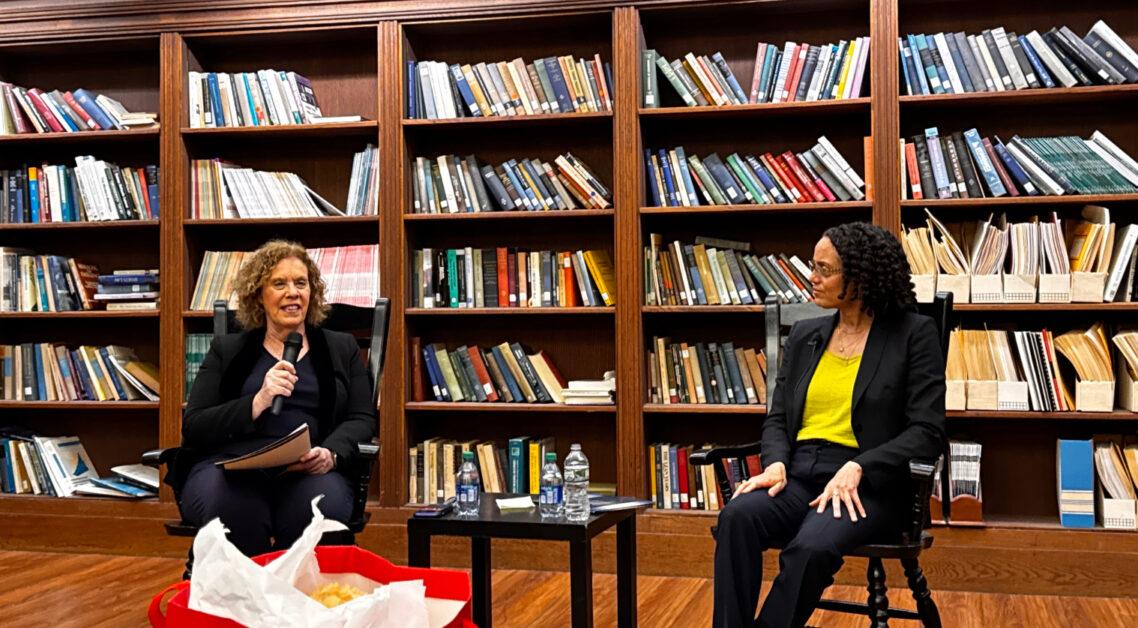The upcoming 2024 U.S. presidential election remains a top priority for the intelligence community, especially amid recent government reports suggesting that Russia, China, and Iran attempted to influence this year’s election, according to Stacey Dixon, principal deputy director of national intelligence.
“There are countries that would love to see Americans standing in the world reduced,” Dixon said. “One way to do that is to highlight the challenges we have internally, to try to create additional divisions between parties, to make it worse, to potentially commit violence depending on the results of elections—that is something that many adversaries would be interested in doing.”
Dixon spoke at Boston College on Oct. 10 at a fireside chat co-hosted by the Islamic Civilizations and Societies program and the International Studies program. Dixon discussed the role of the Office of the Director of National Intelligence (ODNI) in safeguarding U.S. interests and addressing threats from foreign adversaries.
“[The ODNI was] created in the aftermath of 9/11,” Dixon said. “What the Weapons of Mass Destruction Commission found was that there was information in the intelligence agencies and the law enforcement communities that was not making it to each other—that we had information that could have stopped some of the things that happened that day. So the Office of the Director of National Intelligence was created as a small organization to help lead the community to be able to integrate intelligence.”
ODNI played a pivotal role in recent global developments, particularly in the lead-up to Russia’s invasion of Ukraine in 2022, according to Dixon. The U.S. intelligence community worked closely with its allies to share real-time intelligence to counter Russia’s misinformation and attempts to justify its aggression, she said.
“This was something very different for our community: providing as much information as we did to be shared first with partners,” Dixon said. “The [Biden] administration was interested in sharing it more broadly with the world to preempt Putin’s ability to use misinformation and disinformation as justification for the war.”
In 2016, Russian operatives used platforms like Facebook and Twitter to disseminate disinformation and influence voters. The 2020 elections saw similar foreign interference efforts, but they were less effective due to increased awareness and countermeasures, Dixon said.
While social media remains a significant channel for foreign interference, there have been improvements in mitigating these threats, according to Dixon.
“This year in particular, there’s a lot of social media companies, as well as internet service providers, who are looking at it themselves, and, frankly, providing information out to the public about what they’re seeing, what’s affected, whether it’s Russia, Iran, in particular, in the things that they’re trying to do to influence the elections,” Dixon said. “So I do worry about all of those things.”
Dixon also commented on the recent ODNI press briefing in September, where ODNI officials concluded that Russian interference efforts have grown more sophisticated, leveraging tools like artificial intelligence to influence the 2024 election in favor of former president Donald Trump.
“The sort of rationale in terms of who supports who comes back to sort of what their own foreign policy goals are,” Dixon said. “There may be more than that, but some of it comes down to what their own foreign policy goals are. Russia would love to see this war end with it keeping and having the best advantage that it can.”
Despite these concerns, Dixon expressed optimism about the growing awareness of misinformation and disinformation among the American public.
“I’m hopeful that the American public is getting smarter about recognizing misinformation and disinformation,” she said. “We’ve talked about it a lot. There are public service announcements out there. There are warnings that are out there.”














